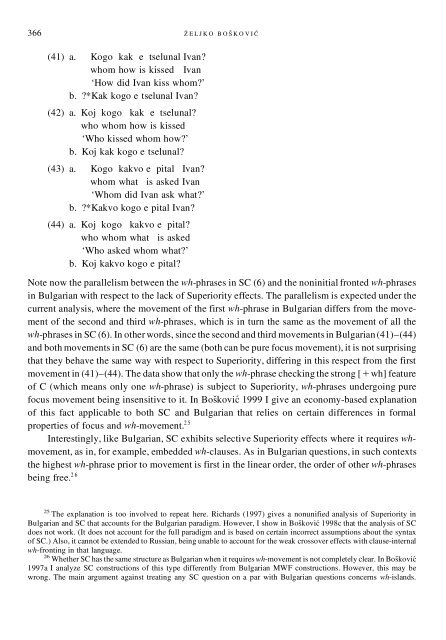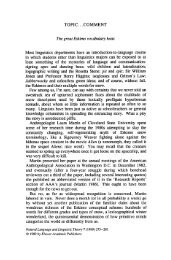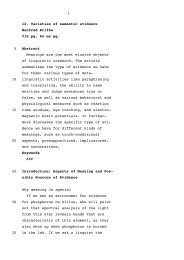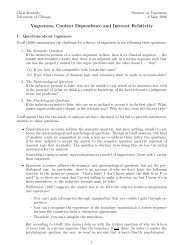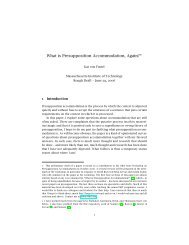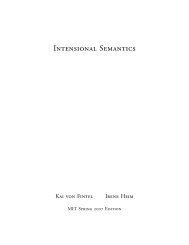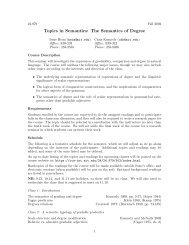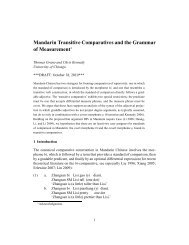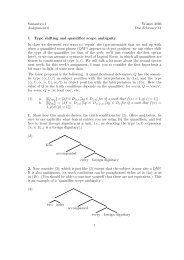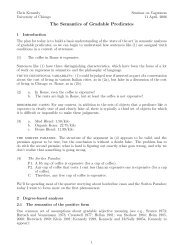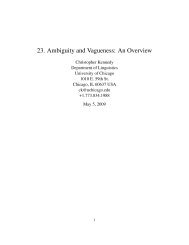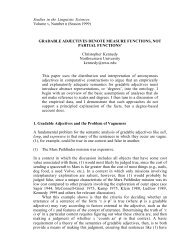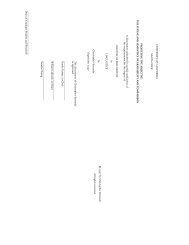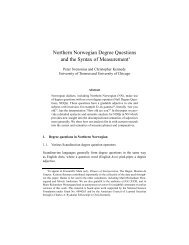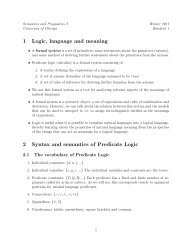On Multiple Wh-Fronting - University of Chicago
On Multiple Wh-Fronting - University of Chicago
On Multiple Wh-Fronting - University of Chicago
Create successful ePaper yourself
Turn your PDF publications into a flip-book with our unique Google optimized e-Paper software.
366 ZÏ E L J K O B O SÏ K O V I Ć(41) a. Kogo kak e tselunal Ivan?whom how is kissed Ivan‘How did Ivan kiss whom?’b. ?*Kak kogo e tselunal Ivan?(42) a. Koj kogo kak e tselunal?who whom how is kissed‘<strong>Wh</strong>o kissed whom how?’b. Koj kak kogo e tselunal?(43) a. Kogo kakvo e pital Ivan?whom what is asked Ivan‘<strong>Wh</strong>om did Ivan ask what?’b. ?*Kakvo kogo e pital Ivan?(44) a. Koj kogo kakvo e pital?who whom what is asked‘<strong>Wh</strong>o asked whom what?’b. Koj kakvo kogo e pital?Note now the parallelism between the wh-phrases in SC (6) and the noninitial fronted wh-phrasesin Bulgarian with respect to the lack <strong>of</strong> Superiority effects. The parallelism is expected under thecurrent analysis, where the movement <strong>of</strong> the first wh-phrase in Bulgarian differs from the movement<strong>of</strong> the second and third wh-phrases, which is in turn the same as the movement <strong>of</strong> all thewh-phrases in SC (6). In other words, since the second and third movements in Bulgarian (41)–(44)and both movements in SC (6) are the same (both can be pure focus movement), it is not surprisingthat they behave the same way with respect to Superiority, differing in this respect from the firstmovement in (41)–(44). The data show that only the wh-phrase checking the strong [`wh] feature<strong>of</strong> C (which means only one wh-phrase) is subject to Superiority, wh-phrases undergoing purefocus movement being insensitive to it. In BosÏ ković 1999 I give an economy-based explanation<strong>of</strong> this fact applicable to both SC and Bulgarian that relies on certain differences in formalproperties <strong>of</strong> focus and wh-movement. 2 5Interestingly, like Bulgarian, SC exhibits selective Superiority effects where it requires whmovement,as in, for example, embedded wh-clauses. As in Bulgarian questions, in such contextsthe highest wh-phrase prior to movement is first in the linear order, the order <strong>of</strong> other wh-phrasesbeing free. 2 625 The explanation is too involved to repeat here. Richards (1997) gives a nonunified analysis <strong>of</strong> Superiority inBulgarian and SC that accounts for the Bulgarian paradigm. However, I show in BosÏ ković 1998c that the analysis <strong>of</strong> SCdoes not work. (It does not account for the full paradigm and is based on certain incorrect assumptions about the syntax<strong>of</strong> SC.) Also, it cannot be extended to Russian, being unable to account for the weak crossover effects with clause-internalwh-fronting in that language.26 <strong>Wh</strong>ether SC has the same structure as Bulgarian when it requires wh-movement is not completely clear. In BosÏ ković1997a I analyze SC constructions <strong>of</strong> this type differently from Bulgarian MWF constructions. However, this may bewrong. The main argument against treating any SC question on a par with Bulgarian questions concerns wh-islands.


